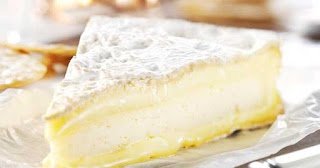 In many ways the story
of Fen Farm Dairy in Suffolk is a familiar one. Third-generation
dairy farmer Jonny Crickmore and his wife Dulcie became so fed up
with rock bottom milk prices in the late noughties that they decided
to turn their hands to cheese-making.
In many ways the story
of Fen Farm Dairy in Suffolk is a familiar one. Third-generation
dairy farmer Jonny Crickmore and his wife Dulcie became so fed up
with rock bottom milk prices in the late noughties that they decided
to turn their hands to cheese-making.
They certainly aren't the first
and won't be the last disillusioned milk producer to diversify, but
the way they have gone about things has demonstrated an unusual
amount of ambition, understanding and flair.
Before setting up, they took advice from Neal's Yard Dairy on the kinds of British cheeses that were missing from the market - a shrewd move that eventually led them to make a raw milk Brie de Meaux-style cheese called Baron Bigod (pronounced 'by-god' and named after a local 12th century nobleman).
The couple then travelled to Comte country in France to buy as many
Montbeliarde cows as they could lay their hands on.
“They produce
fantastic quality milk for making cheese so we found a contact in
France, who knew a lot of farmers, and then basically drove around
visiting lots of small dairy farms, buying one or two cows from
each,” says Jonny Crickmore. “We visited well over 30 farms in
three days - it was all a bit of a whirlwind.”
They came back with 72
Montbeliarde cows, which must have been slightly confused to suddenly
find themselves in a field near Bungay.
It's only been three years since the first cheeses were made, but Fen Farm already
supplies some of the country's best cheesemongers, including The Courtyard Dairy and La Fromagerie. Neal's Yard, which takes around dozens of the 3kg cheeses each week, has seen sales of Baron Bigod outstrip its French Brie de Meaux by as much as seven to one.
“It's going really
well and that's partly because no one else makes a raw milk Brie de
Meaux in the UK,” says Crickmore. “There are lots of artisan
producers buying milk from farms, but not many who do both, so it
really makes us quite unique.
Members of the public travel from far and wide to buy raw milk, butter and the cheese directly
from the farm's cow-print shed. The growing interest in the health
and taste benefits of unpasteurised milk has definitely helped Baron
Bigod, says Crickmore.
“The more people talk
about raw milk and the more coverage there is in the press, the
better it is for the cheese,” he says. “People are now asking
specifically for unpasteurised cheese. They are just that more
aware.”
Despite his success,
Crickmore says he is still learning as a cheese maker and is
continually assessing the cheese and tweaking the recipe. Rather than slavishly
following a recipe, he adapts the process depending on how the
milk is behaving on a particular day, so if the cheese is too dry, he
will use less starter culture or cut the curds a bit bigger to retain
moisture.
“Sometimes you think
you have the perfect recipe, but then a few weeks later the cheese is
totally different,” he says. “That's because the milk changes
during lactation or the temperature of the cheese room is different.
It's about learning from those changes and adjusting what you do.
That's the true art of cheese making.”
There's a nice video about the company here:
A version of this article was published in Fine Food Digest magazine.

The post was nice and quiet meaningful; also your blog is pretty cool too, it helps a lot of people because of how you convey the information through simple words.
ReplyDeleteDiscounts Code